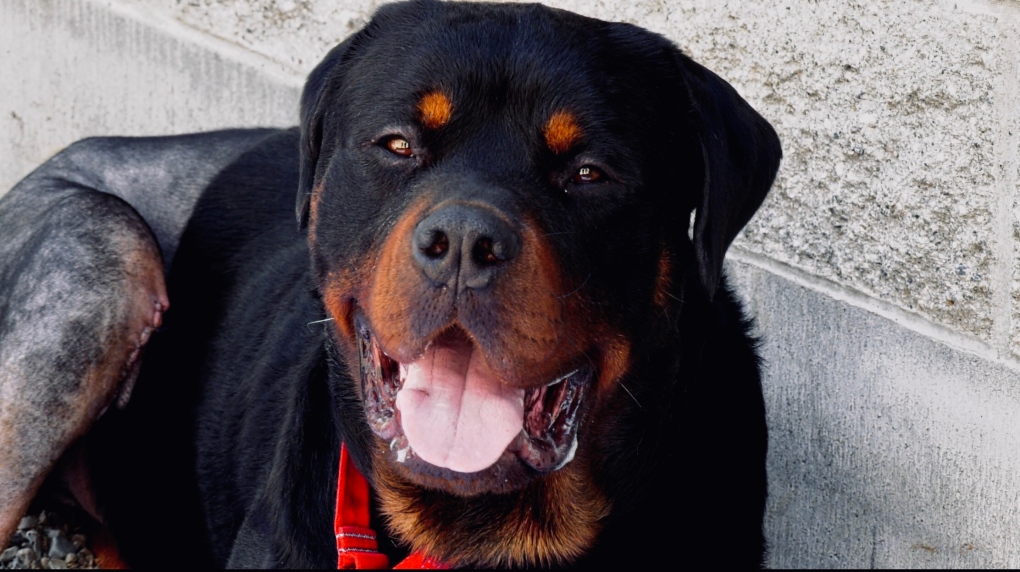Vancouver animal hospital says it's treating 2 dogs for severe heat stroke
 The Comox Valley SPCA are looking after a two-year-old Rottweiler, Momoa, after he was found abandoned at a local dump.
The Comox Valley SPCA are looking after a two-year-old Rottweiler, Momoa, after he was found abandoned at a local dump.
A Vancouver vet is warning pet parents about the effects of heat on pets as he treats two dogs for severe heat stroke.
Critical care veterinarian Dr. Carsten Bandt of Canada West Veterinary Specialists says that unlike humans, dogs have a limited ability to sweat. As a result, even a short time in a hot environment can result in fatal heat stroke.
“Heat stroke can lead to bleeding, severe hemorrhagic diarrhea, organ failure and death,” he said in a statement.
On Saturday morning, Bandt’s team put out a news release saying the hospital is currently treating two dogs suffering from “severe heat stroke.”
“If it’s too hot for you or if the sidewalk is too hot to touch for a few minutes, it’ll be too hot for your dog as well,” Bandt said.
“Pets depend on owners to keep them safe and now is the time to consider the impact of extreme heat and take the proper precautions.”
Bandt said that heat stress happens quickly. Here’s a list of rules and tips from the clinic.
- Pets should never be left in cars, even for a few minutes.
- Dogs should not be tied up in the sun, should not be walked during the hottest part of the day, and should not be walked on hot pavement.
- Give dogs less exercise overall during a heat wave.
- Take dogs out for walks and plays in the early morning or in the evening when the temperature is lower.
- If it’s cooler inside your home than it is outside, keep dogs indoors.
- Make sure dogs are not confined somewhere where it could get too warm.
- Be aware that some dogs love to lie in the sun, even when they shouldn’t, and then they start panting excessively.
- Be aware that many dogs don’t have the “good sense” to play in the shade instead of the sun.
- Old, large-breed dogs are particularly vulnerable to heat stroke – check for noisy breathing or change in the sound of their bark.
- Some smaller-breed dogs may develop a “honking cough with excitement or with heat,” which can be a sign of a collapsing trachea.
CTVNews.ca Top Stories

Trump chooses anti-vaccine activist Robert F. Kennedy Jr. as health secretary
U.S. President-elect Donald Trump says he will nominate anti-vaccine activist Robert F. Kennedy Jr. to lead the Department of Health and Human Services, putting him in charge of a massive agency that oversees everything from drug, vaccine and food safety to medical research and the social safety net programs Medicare and Medicaid.
LIVE UPDATES Rogers Centre opens its doors to thousands of Taylor Swift fans for the first sold-out show
Taylor Swift is in Toronto to perform her first of six sold-out shows at the Rogers Centre tonight.
Purolator workers won't handle Canada Post packages if strike occurs, union says
Teamsters Canada says if Canada Post workers go on strike or are locked out, its members at Purolator won't handle any packages postmarked or identified as originating from the carrier.
Canada urged to cut government-funded research collaborations with China: report
A newly released report is urging Canada to immediately end all government-funded research collaborations with China in a variety of different areas.
Measles cases in New Brunswick continues to climb
The number of measles cases in New Brunswick continues to climb. Officials with New Brunswick’s Department of Health said as of Thursday, the number of confirmed cases since October has reached 43.
Police release bodycam video of officer-involved incident at Hindu temple protest in Brampton, Ont.
Police say an officer who forcefully removed a 'weapon' from a protester outside of a Hindu temple in Brampton was acting 'within the lawful execution of his duties' after bystander video of the incident circulated widely online.
Here's how a potential Canada Post strike may affect Canadians
A disruption in Canada Post services would hit some Canadians harder than others. As the deadline approaches for a potential strike at midnight Friday, CTVNews.ca asked readers how it would affect them and how they are preparing.
Police foil attempted $13,000 cheese theft in North Vancouver
Police in North Vancouver say they prevented the theft of nearly $13,000 worth of cheese from a grocery store earlier this year. Now, they're asking the public for help finding the alleged thief.
Partial confinement lifted in Longueuil after CN train derailment and chemical spill
The City of Longueuil has partially lifted the confinement measure currently in effect around the site of a CN train derailment near Jacques-Cartier West Boulevard and Saint-Georges Street after the incident spilt an unknown quantity of hydrogen peroxide Thursday morning.
































